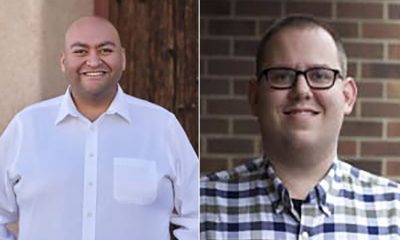Opinions
America needs more LGBTQ mayors
Local officials are on the front lines pushing equality
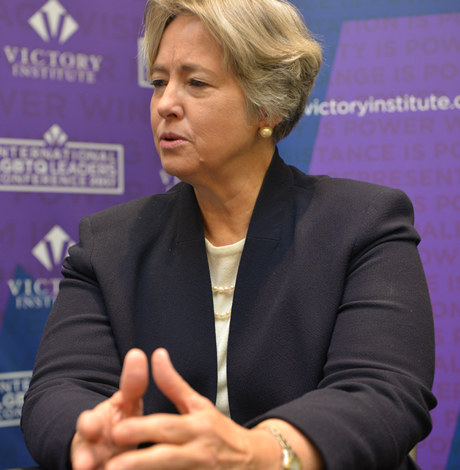
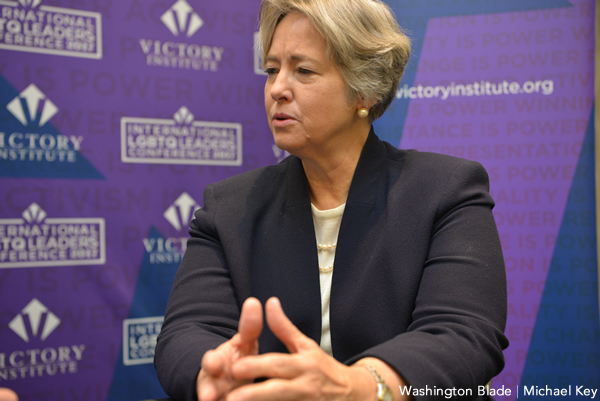
Annise Parker (Washington Blade photo by Michael Key)
While the biggest news out of Washington the week of Jan. 22 will either be the government shutdown or the latest presidential tweet, a far more consequential event is unlikely to make major headlines. Mayors from across the nation will converge on the capital to work on critical issues affecting our nation: tackling the opioid epidemic, combating climate change or ending homelessness in our communities. These issues – more than any offensive nickname Donald Trump can come up with – is what will improve or hinder the lives of millions of Americans.
It is the leadership of mayors, as well as their colleagues in local governments, that have the most significant impact on people’s everyday lives. Local government ensures roads are built and repaired, trash is collected, and that law enforcement is properly protecting communities. The winter meeting of the U.S. Conference of Mayors is an opportunity for mayors to exchange ideas and brainstorm solutions, knowing they are more accountable to constituents than any politician at the federal level.
While all mayors have a broad array of responsibilities, LGBTQ mayors in particular take on additional duties – ensuring equality remains on the agenda and representing our community to the people they serve.
When I became mayor of Houston in 2010, I heard from dozens of parents of LGBTQ children who were overwhelmed about my election. They may or may not have agreed with all my policy positions, but my presence alone proved their children could pursue their dreams regardless of sexual orientation or gender identity. They understood I would block attempts to harm our community, push forward pro-equality legislation and be a voice for the voiceless in a state that desperately needed it.
Mayors have more impact on daily life than any other elected official. LGBTQ mayors are champions for equality, but their agendas are much broader. Javier Gonzales was one of the first mayors in the country to declare that Santa Fe will continue to protect its immigrants despite federal threats to withhold funding. Jenny Durkan created a program to provide two years of free community college to any high school graduate in Seattle – and did it less than 24 hours after taking office. And in Long Beach, Robert Garcia is championing the creation of a world-class rail system that can transform the region. These are bold leaders with bold ideas.
And it was their ideas – not their sexual orientation or gender identity – that helped them win elected office in the first place. During my first two City Council campaigns, media outlets branded me the ‘lesbian candidate,’ focusing on my sexual orientation at the expense of covering my vision for the city. Two losses were the result. Before my third campaign, I sat down with editors and explained their failure to report on my policy agenda despite regularly covering the issue positions of my opponents. The coverage changed, and so did the results. I won my next nine elections – three each for city council, city controller and mayor.
With a constituent-focused agenda our people can win anywhere. Yet only 27 openly LGBTQ people are serving as mayor anywhere in the country. America needs more values-driven LGBTQ leaders who can advance equality and tackle the issues that matter to people’s lives. We need more LGBTQ people to run for office and be the change we want to see in America and the world.
The first office held may not be as sexy as governor or as powerful as big city mayor – maybe it’s a neighborhood commission, school board or city council. But these positions are vital to improving the lives of people across the nation, and are the stepping-stones to positions in state legislatures, the governors’ mansions and the U.S. Senate.
Are you ready to run? America and our community need you.
Annise Parker, former mayor of Houston, is president and CEO of LGBTQ Victory Institute, which trains LGBTQ leaders to run for office.
Commentary
Defunding LGBTQ groups is a warning sign for democracy
Global movement since January 2025 has lost more than $125 million in funding

In over 60 countries, same-sex relations are criminal. In many more, LGBTIQ people are discriminated against, harassed, or even persecuted. Yet, in most parts of the world, if you are an LGBTIQ person, there is an organization quietly working to keep people like you safe: a lawyer fighting an arrest, a shelter offering refuge from violence, a hotline answering a midnight call. Many of those organizations have now lost so much funding that they may be forced to close.
One year ago this week, the U.S. government froze foreign assistance to organizations working on human rights, democracy, and development worldwide. The effects were immediate. For LGBTIQ communities, the impact has been severe and far-reaching.
For 35 years, Outright International has helped build and sustain the global movement for the rights of LGBTIQ people, working with local partners in more than 75 countries. Many of those partners are now facing sudden closure.
Since January 2025, more than $125 million has been stripped from efforts advancing the human rights of lesbian, gay, bisexual, transgender, intersex, and queer people globally. That figure represents at least 30 percent of yearly international funding for this work. Organizations that ran emergency shelters, legal defense programs, and HIV prevention services have been forced to close or drastically scale back operations. At Outright alone, we lost funding for 120 grants across nearly 50 countries. We estimate that, without intervention, 20 to 25 percent of our grantee partners risk shutting down entirely.
But this is not only a story about one community. It is a story about how authoritarianism works, and what it costs when we fail to recognize the pattern.
The playbook is not subtle
Researchers at Outright and partners across human rights and democracy movements have documented the same sequence playing out across sectors worldwide: governments defund organizations before passing restrictive legislation, eliminating the groups most likely to document abuses before abuses occur.
In December, CIVICUS downgraded its assessment of U.S. civic freedoms from “narrowed” to “obstructed,” citing what it called a “rapid authoritarian shift.” The message was unmistakable: independent organizations that hold power to account are under growing pressure, in the United States and around the world.
And the effects have cascaded globally. When one of the world’s largest funders of democracy support and human rights work withdraws, it doesn’t just leave a funding gap. It sends a signal to authoritarians everywhere: the coast is clear.
The timing is not coincidental. In the super election year of 2024, 85 percent of countries with national elections featured anti-LGBTIQ rhetoric in campaigns. Across the 15 countries we tracked, governments proposed or enacted laws restricting gender-affirming care, rolling back legal gender recognition, and censoring LGBTIQ expression. The defunding often came first. Governments know that if they can starve the movement, there will be no one left to document what comes next.
Why US readers should care
It may be tempting to see this as a distant crisis, especially at a moment when LGBTIQ rights in the United States are under real pressure. But this story is closer to home than it appears. American funding decisions often help determine whether organizations protecting LGBTIQ people abroad can keep their doors open. And when independent organizations are weakened, no matter where they are, the consequences do not stay contained. The same political networks driving anti-LGBTIQ legislation in the United States share strategies and resources with movements abroad. Global repression and domestic rollback are not separate stories. They are the same story, unfolding in different places.
LGBTIQ organizations are often the first target, but never the last
Why target LGBTIQ communities first? Because we are politically easier to isolate. The same playbook — foreign funding restrictions, bureaucratic harassment, banking access denial — is now being deployed against environmental groups, independent media, women’s rights organizations, and election monitors. When one part of our community is silenced, all of us become more vulnerable. What happens to us is a preview of what happens to everyone.
This is not speculation. It is documented history. In Hungary, the government restricted foreign funding for civil society before passing its “anti-LGBTQ propaganda” law. In Russia, “foreign agent” designations preceded the criminalization of LGBTIQ identity. In Uganda, funding restrictions on human rights organizations came before the Anti-Homosexuality Act. The pattern repeats because it works.
And yet, even as these attacks intensify, victories continue. In 2025, Saint Lucia struck down a colonial-era law criminalizing consensual same-sex intimacy after a decade of regional planning and coalition-building. Courts in India, Japan, and Hong Kong upheld trans people’s rights. Budapest Pride became the largest in Hungarian history — and one of the country’s biggest public demonstrations — despite a government ban. In Thailand, years of patient advocacy culminated in marriage equality becoming law in 2025, the first such victory in Southeast Asia.
These wins happened because our movement built the capacity to survive hostility. Legal defense funds. Documented evidence. Regional coalitions. Emergency response networks. The organizations behind these victories are precisely the ones now facing drastic funding cuts and even closure.
What we are doing and what we need
On Jan. 20, 2026, Outright International publicly launched Funding Our Freedom, a $10 million emergency campaign running through June 30, 2026. We have already secured over $5 million in pledges from more than 150 donors. But the gap remains enormous.
The campaign supports two priorities that must move together. Half of the funds go directly to frontline LGBTIQ organizations facing sudden shortfalls: keeping staff paid, maintaining safe spaces, securing legal support, and continuing essential services. The other half supports Outright’s global work: documenting abuses, training activists, and advocating for LGBTIQ inclusion at the United Nations and other international forums. This is how LGBTIQ people remain seen, heard, and defended, even when governments attempt to erase them.
We structured Funding Our Freedom this way because frontline support without protection is fragile, and global advocacy without frontline truth is hollow. Both must survive.
Funding Our Freedom is not charity. It is how we keep the global LGBTIQ movement alive when governments try to erase it.
A call to those who believe in equality and democracy
If you are part of the LGBTIQ community, this moment is personal. Whether you give, share this work, host a small fundraiser, or bring others into the effort, you become part of what keeps our global community connected and protected.
If you are an ally or simply someone who believes in fairness, free expression, and accountable government, this fight is yours too. The defunding of LGBTIQ organizations is not an isolated decision. It is a test case. If it succeeds, the same tactics will be used against every group that challenges power and defends vulnerable people.
We are not asking for sympathy. We are asking for commitment. The organizations now being forced to close are the ones that document abuses, provide legal defense, support people in crisis, and show up when no one else will. If they disappear, we lose more than services. We lose the ability to know what is happening and to respond.
Authoritarians understand this. That is why they target us first.
The question is whether the rest of us understand it in time.
Maria Sjödin is the executive director of Outright International, where they has worked for over two decades advocating for LGBTIQ human rights worldwide. Learn more at outrightinternational.org/funding-our-freedom.
Opinions
ICE agents murder another American citizen in Minneapolis
Trump and his Cabinet are the real ‘domestic terrorists’
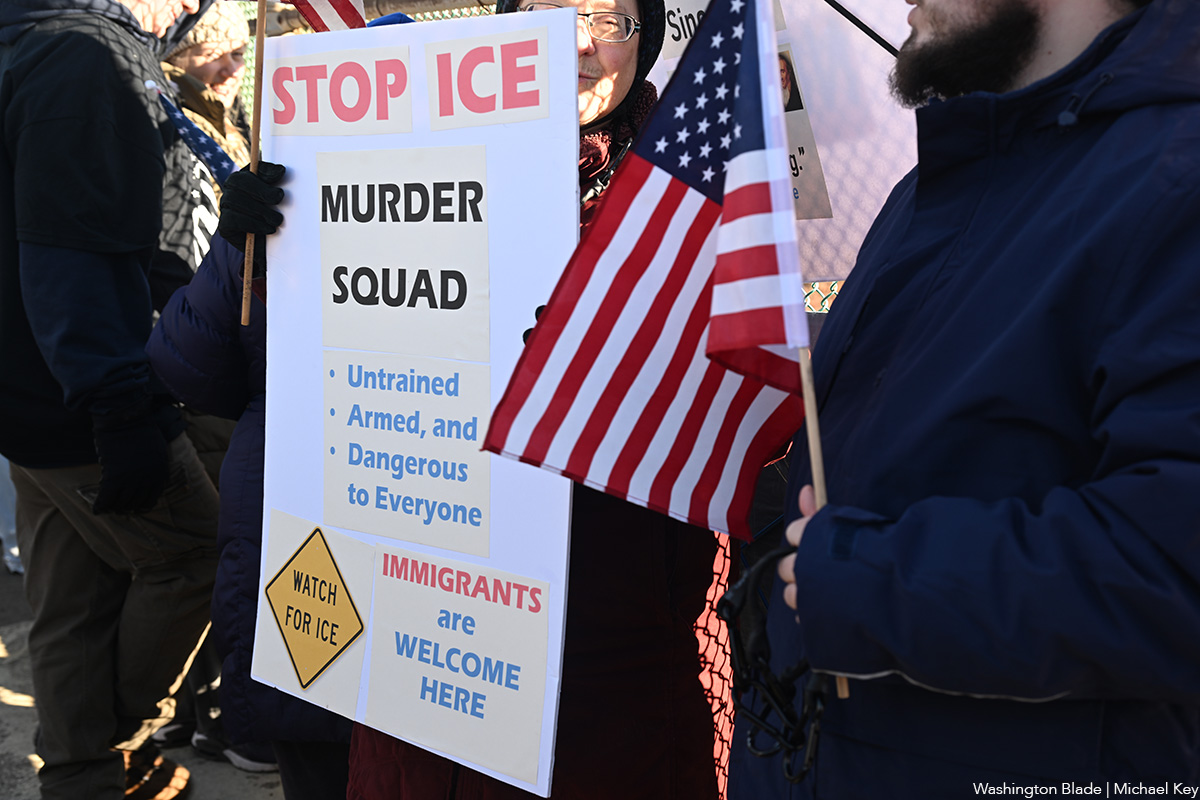
ICE agents murdered another American citizen on the streets of Minneapolis. His murder is both caused, and condoned, by the evil felon in the White House, and his incompetent, and equally evil, Secretary of Homeland Security, Kristie Noem. She, the woman who thought nothing of killing her dog, now apparently thinks nothing of killing American citizens. The most recent murder, condoned by both of them, occurred on Jan. 24 and was that of Alex Jeffrey Pretti, a 37-year-old U.S. citizen.
His grieving parents released a statement, “We are heartbroken but also very angry. Alex was a kindhearted soul who cared deeply for his family and friends and also the American veterans whom he cared for as an ICU nurse at the Minneapolis VA hospital. Alex wanted to make a difference in this world. Unfortunately, he will not be with us to see his impact. I do not throw around the hero term lightly. However, his last thought and act was to protect a woman. The sickening lies told about our son by the administration are reprehensible and disgusting. Alex is clearly not holding a gun when attacked by Trump’s murdering and cowardly ICE thugs. He has his phone in his right hand, and his empty left hand is raised above his head while trying to protect the woman ICE just pushed down all while being pepper sprayed. Please get the truth out about our son. He was a good man. Thank you.”
All this occurred amid heightened tensions in the city following recent clashes over federal immigration actions. The chaos in Minneapolis is clearly caused by the federal agents. We have also been told by the Minneapolis police that Pretti had no criminal record beyond minor traffic violations and held a valid Minnesota permit to carry a concealed weapon. His family said they had never seen him carry it.
The chaos in Minneapolis was heightened after an ICE agent murdered Renee Good, while she was in her car. The agent who shot her was clearly seen in videos to be in no danger. “An autopsy commissioned by the family this month, found that she suffered three clear gunshot wounds, including one to her head, lawyers for her family said Wednesday. One of the injuries was to Good’s left forearm, the lawyers said in a statement, while another gunshot struck her right breast without piercing major organs. Neither of those wounds was immediately life-threatening, the attorneys said. A third shot entered the left side of Good’s head near the temple and exited on the right side, according to the statement, and she also appeared to have sustained a graze wound.”
After both these murders, the felon and his lapdog, Noem, claimed the murders were appropriate as both victims were ‘domestic terrorists.’ In both cases they told Minnesota law enforcement they could not participate in the investigation. Clearly, they don’t want real investigations. It has become crystal clear, the felon in the White House considers anyone who disagrees with him, or his policies, a ‘domestic terrorist’. I, and so many others, consider the felon, and his personal Goebbels, Stephen Miller, along with Noem, and others in his Cabinet, to be the real ‘domestic terrorists.’
In my lifetime, I have never seen a president declare war on American citizens, but that is what this president is doing. He is sending federal agents, including the National Guard, into cities across the nation, to fight with, and threaten to curb, the legal actions of American citizens. He is a clear danger to our democracy, and is being assisted by the Republicans in Congress, and the Supreme Court. They are all guilty of enabling his vicious attacks on all of us.
When Renee Good and Alex Pretti were gunned down, we all suffered. We were all attacked, when they were attacked. None of us can feel safe if during a legal demonstration, we can be murdered, and no one will step forward to stop it from happening. We live in a country where our Secretary of Health and Human Services, RFK Jr., is literally killing children by saying they shouldn’t be vaccinated against diseases that can be prevented with a vaccine and by ending research into Alzheimer’s, cancer, and HIV/AIDS. This is the government of the felon, and his campaign against our own people.
Every person in a minority, or group who has ever been discriminated against, is at risk while the felon is in the White House. Whether you are a woman, Black, Asian, Latino, Jewish, Muslim, or LGBTQ, you are being threatened by this administration, your rights, and even your life, are being threatened. We must all stand together, and work to stop him, or as the poem, “First They Came,” attributed to Lutheran pastor Martin Niemoller, will prove to be true. There are many versions of the poem and just put your group in any of the paragraphs, and you will clearly understand its meaning. The United States Holocaust Memorial Museum quotes the following text as one of the many poetic versions:
First, they came for the socialists, and I did not speak out—Because I was not a socialist.
Then they came for the trade unionists, and I did not speak out—Because I was not a trade unionist.
Then they came for the Jews, and I did not speak out—Because I was not a Jew.
Then they came for me—and there was no one left to speak for me.
Peter Rosenstein is a longtime LGBTQ rights and Democratic Party activist.
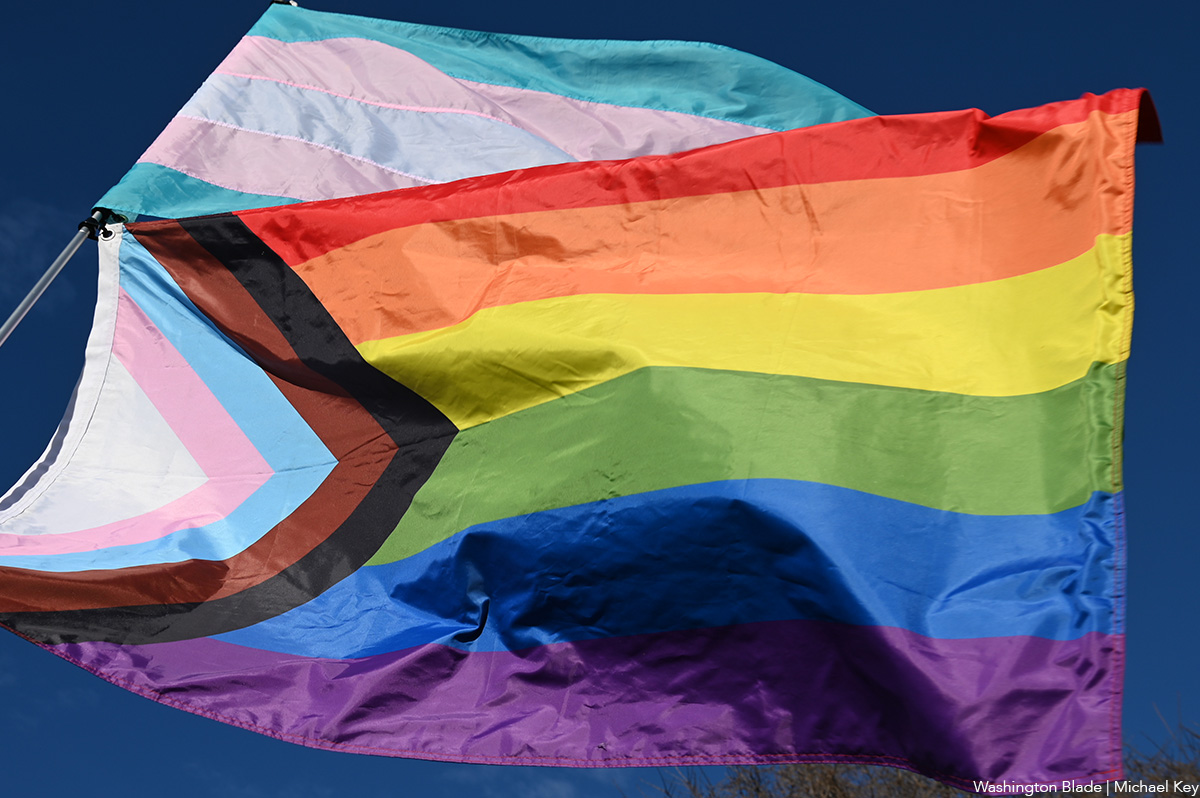
Authoritarianism does not announce its arrival. It’s too cowardly for that. It advances quietly, at the margins, testing how much fear and cruelty a community will tolerate and what bystanders will allow to happen to fellow human beings. History shows that queer folks, especially trans people, are often targeted first. That targeting is not incidental. It is intentional.
Defending queer rights is not a niche concern. It is a test of democratic health. A society that allows one group to be targeted will not stop there. Those who come for queer people in the morning are the same that go for educators, journalists, voters, and civil institutions in the afternoon. This is not speculation. It is a well-worn pattern.
Around the world, LGBTQ+ communities are under coordinated attack. In Russia, the so-called “international LGBTQ movement” has been labeled extremist, legally equating queer identity with terrorism. We are seeing distinct echoes of that foreign influence here at home. Elsewhere, governments criminalize queer existence, erase trans people from public life, or force people into silence through intimidation. The sequence is familiar: dehumanizing rhetoric, restrictive policy, and eventually open endorsements of violence. When these warning signs are ignored, repression accelerates.
It would be comforting to believe this is distant or abstract. It is not. In the United States, LGBTQ+ people, including trans people, have sought asylum abroad because they no longer feel safe in our own communities. When our neighbors must leave to feel safe, we have failed our community.
Experts at the Lemkin Institute for Genocide Prevention have warned that trans communities in the United States face serious and escalating danger. Their analysis is grounded in history. Genocide is not only mass killing. It is the systematic destruction of a group’s ability to exist safely and openly. Legal erasure, public demonization, exclusion from institutions, and tolerated harassment are all early stages of that process. History is clear. The time to act is before harm becomes irreversible.
Democratic backsliding rarely arrives with fanfare. It comes through school board votes, bureaucratic rules, elected leaders’ inaction, and symbolic reversals that seem small until they accumulate. This is how erosion takes hold.
In Salisbury, Md., my hometown, that erosion has become visible. The city halted the flying of Pride flags during Pride month and removed our downtown rainbow crosswalk. These were not neutral administrative choices. They sent a clear message to queer residents that their visibility and belonging are unwelcome.
When a community removes symbols that affirm dignity and safety, when books reflecting queer realities are pulled from schools and libraries, when children are excluded from participating in life simply because they are different, it creates harm. It teaches that difference is dangerous. And when politicians and people in positions of responsibility fail to protect trans kids, real harm follows: mental health crises, isolation, and even lives lost.
Pride flags, rainbow crosswalks, inclusive curricula, and supportive policies are not merely symbolic. They communicate that everyone belongs and that discrimination will not be tolerated. Removing them isolates queer people and emboldens those who see community as an exclusive club rather than a shared responsibility.
Queer liberation is not separate from the liberation of the broader community. It is inseparable from it. Living openly as queer challenges systems built on fear, rigid roles, and enforced conformity. When queer people gain ground, everyone gains ground. Each victory for queer liberation strengthens democracy itself.
This is how we know progress is possible. Every time a Pride flag stays flying. Every time a crosswalk remains painted. Every time a local ordinance protects gender identity. Every time a school affirms a student’s dignity. These are not small wins. Liberation grows through accumulation.
National politics can feel chaotic and overwhelming. Federal institutions are slow, complex, and distant. But democratic defense does not begin there. It begins locally, when neighbors show up to town halls, demand accountability, and refuse to let bigotry shape policy. It does not take extraordinary power to protect a city council chamber or a school board meeting. It takes people willing to stand up. It takes bystanders willing to step in.
This is the moment to act. Silence enables erosion. Action creates momentum. The question is not whether change is possible. It is whether you are willing to claim it.
Queer liberation is your liberation. When we defend the most targeted among us, we defend the future we all share. Every Pride flag flown, every rainbow crosswalk returned, every book left on the shelf, and every policy that affirms dignity sends a message far beyond town limits. It tells the world that democracy is being defended here.
Local victories are global victories. And every one of them matters.
Will Fries. is a Maryland communications strategist with experience in multiple major presidential campaigns.





